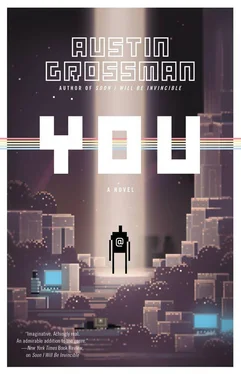After dinner, most of the campers sat on the front steps below the entrance to the dorm long after quiet hour, a few boldly smoking cigarettes. I looked out through the screen door, breathing the warm air. I couldn’t see out past the circle of orange-yellow lights that shone down on the granite steps and a few yards out along the asphalt, just to the edge of the grass. Beyond that there was only blackness out to where the quad ended and the trees began. I heard a car pass on the main road, too far off to see.
I wasn’t ready to sleep. It would be the first time I had ever slept away from home. I slipped out a side door and circled the building, trailing one hand along the rough brick. I heard Darren’s voice mingled with the others, but I wasn’t ready to join them. I walked straight out onto the quad, into the darkness. The stars got visible really fast out there. I couldn’t see my own body and it made me dizzy. I ran a little ways. I was the only one out there—was that strange? Why was I different? I spun around, the stars whirling above me, then lay on my back in the grass. I’d forgotten what it felt like to be comfortable. Nobody knew me here except the Realms gang, and they didn’t care who I was. I was starting to feel, maybe for the first time in my life, that I had arrived where I was supposed to be.
I listened to the others back in the circle of light behind me. “What group are you in?” they called out to each newcomer. “B Group,” a male voice answered, followed by two or three cheers. Introductions. There were already rumors of a hookup but nobody knew exactly who; and they said a few people had broken into Main and hacked the phone switchboard to call—depending on the version told—Anchorage, the camp office, Hong Kong, and/or NORAD. Tomorrow, classes would start, and the whole summer’s saga, but this is what I would remember. The crickets were incredibly loud. It was summer; there would be weeks of this before I had to go back. Oceans of time. I’d be a different person. I couldn’t wait.
All the next day, we were trying to figure out who exactly everybody was, who we were, who showed up to this. Who exactly likes computers? We picked our way barefoot along the dirt and pine-needled track to the lake, where, two at a time, we lowered ourselves off the dock and swam the length of the roped-off section of chill dark water and then back. A full dozen of us mustered signed medical exemptions and stood off to the side, arms folded against the cold, watching the spectacle. The others floundered, heaving, to the finish line or turned in smoothly athletic performances.
Who likes computers? The skinny mantislike kid with the bowl-cut hair; the one girl out of twenty who wore a bikini instead of a one-piece bathing suit; the seventeen-year-old boy with noticeable abdominal muscles and an almost-mustache; the kid who just froze at the end of the dock for a full minute before being let off the hook by the bewildered swimming counselor.
The programming classes were no less brutal. Most of the campers were self-educated in different languages, BASIC and FORTRAN and LISP and C, and now they were all expected to pick up and use Pascal whether or not they’d seen it before. Kids talked over each other, and insufficiently brilliant questions could be punished with an eye roll and an audible “Tch!” from the back row. Nerds could be bullies, too, and the usual targets were poorer kids who hadn’t had much computer access and, unfortunately, girls. Maybe this was part of why Realms II took hold. It was both an arena for people to prove themselves and a collective goal bigger than any one person’s test scores.
It was the first time Simon had been thrown into the larger population of kids who programmed, up against kids whose parents had money and bought them Sinclair ZX81s the moment they started to be available. This was how he must have learned he was good at programming. As the summer went on he fidgeted more often in class, or asked questions that jumped ahead of the curriculum or out of it altogether.
There were two or three kids marked out that way, and a dozen others who pretended they were, but for some reason genius is terribly conspicuous in computer programming. As is mediocrity—I knew that no matter how hard I worked I wasn’t one of them. I wrote code that merely did what it was supposed to do. Simon’s solutions were rapid and weird—convoluted, sometimes in a pointless way, often in a way that looked pointless until you saw how elegant it was.
On the third night of camp, Simon and Darren and Lisa and I, with two recruits from among the campers, stayed up until one in the morning entering the entire Realms code base onto the local network, all four of us sweating, typing in silence as crickets buzzed and chirped outside. There was no air-conditioning and only dim fluorescent lighting from overhead panels dappled with the bodies of trapped insects. It took two more frustrating hours of compiling and recompiling to weed out the typos and the little glitches from the slightly different flavor of the local COBOL variant, but at three twelve we had a local executable version of Realms 0.8 . Before he went to bed Darren handwrote a note giving its location on the Net and tacked it to an inconspicuous corner of the computer lab’s bulletin board.
At lunchtime the following day Simon discovered three sheets of notebook paper tacked up in the same spot, written in blue ballpoint in an unfamiliar hand. He took it down. It was code. The style was alien to him, but reading and rereading it he gradually understood that it was a program that, added to the game, would set up an AI pet that followed the player around, fetching useful items and nipping at enemies. The pet could be a dog, cat, hawk, or iguana, each with different behaviors and special abilities.
That evening there were two more code samples in two new sets of handwriting. There was a primitive lighting model that found lines of sight and the strength of different light sources, and could reveal or conceal the world accordingly. There was also a rewrite of the wind direction code that incorporated the basic idea of moving hot and cold air masses and the position of mountains and oceans in the landscape. A day later Darren came back to the lab to find that someone had printed the source code and annotated the entire length of it with scribbled taunts in the margins alongside code optimizations and fairly witty critiques of Simon’s amateurish code architecture. On the fourth night Darren called a full-scale camp meeting in a note tacked up in the same spot. We’d meet at eleven thirty in the dining commons. Bring a pen and a flashlight.
It’s a moment I think back on, a moment Darren instinctively grasped and owned. The product pitch was its own minor performance-art form, and Darren was born a master of it. Standing on a bench in the dining commons, lit by a few flashlights, Darren already had the bobbing walk and mischievous almost-grin that would be so devastatingly charismatic on the stage at CES and Macworld, and he never really needed the stagecraft of a fifty-foot-high projection to make you want what he was selling. He had his own hyperdorky magnetism, a controlled contagious excitement crossed with adolescent cool. He gave you the sense that he really, really hated to show you what he was working on, but he couldn’t resist because it was so cool he couldn’t hold it back any longer. A bit like the mean but terribly charismatic older brother who was busy all the time, whom you couldn’t help longing to hang out with, who just once was going to let you into the clubhouse.
He talked about the game we’d make, its ambition, its potential. He sketched the outlines, and then he opened a copy of that month’s issue of Creative Computing magazine. WarGames wasn’t the most important gamer-related media event of June 1983. That was also the month when the most important advertisement in the history of computer games came out. It ran in Creative Computing magazine and took up two full pages. On the left-hand page, two columns of text were spanned at the top with the sentence CAN A COMPUTER MAKE YOU CRY? The right kind of person understood the question intuitively as a challenge. The text underneath began:
Читать дальше





![Ally Carter - [Gallagher Girls 01] I'd Tell You I Love You But Then I'd Have to Kill You](/books/262179/ally-carter-gallagher-girls-01-i-d-tell-you-i-lo-thumb.webp)






